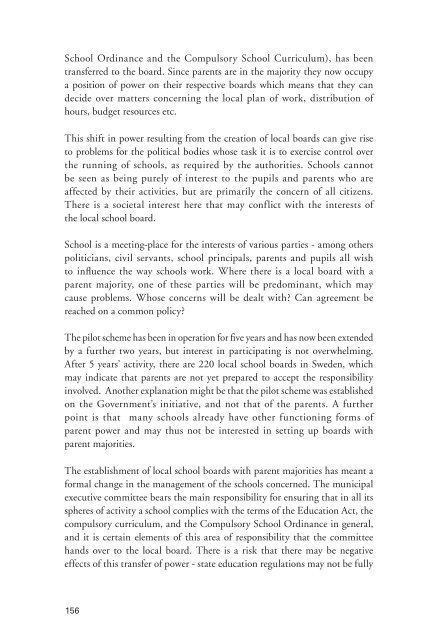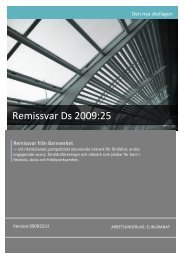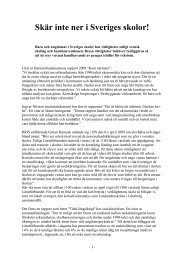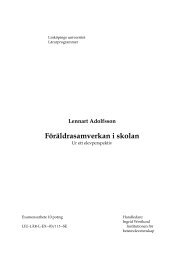Föräldrainflytande i grundskolan - Barnverket
Föräldrainflytande i grundskolan - Barnverket
Föräldrainflytande i grundskolan - Barnverket
Create successful ePaper yourself
Turn your PDF publications into a flip-book with our unique Google optimized e-Paper software.
School Ordinance and the Compulsory School Curriculum), has been<br />
transferred to the board. Since parents are in the majority they now occupy<br />
a position of power on their respective boards which means that they can<br />
decide over matters concerning the local plan of work, distribution of<br />
hours, budget resources etc.<br />
This shift in power resulting from the creation of local boards can give rise<br />
to problems for the political bodies whose task it is to exercise control over<br />
the running of schools, as required by the authorities. Schools cannot<br />
be seen as being purely of interest to the pupils and parents who are<br />
affected by their activities, but are primarily the concern of all citizens.<br />
There is a societal interest here that may conflict with the interests of<br />
the local school board.<br />
School is a meeting-place for the interests of various parties - among others<br />
politicians, civil servants, school principals, parents and pupils all wish<br />
to influence the way schools work. Where there is a local board with a<br />
parent majority, one of these parties will be predominant, which may<br />
cause problems. Whose concerns will be dealt with? Can agreement be<br />
reached on a common policy?<br />
The pilot scheme has been in operation for five years and has now been extended<br />
by a further two years, but interest in participating is not overwhelming.<br />
After 5 years’ activity, there are 220 local school boards in Sweden, which<br />
may indicate that parents are not yet prepared to accept the responsibility<br />
involved. Another explanation might be that the pilot scheme was established<br />
on the Government’s initiative, and not that of the parents. A further<br />
point is that many schools already have other functioning forms of<br />
parent power and may thus not be interested in setting up boards with<br />
parent majorities.<br />
The establishment of local school boards with parent majorities has meant a<br />
formal change in the management of the schools concerned. The municipal<br />
executive committee bears the main responsibility for ensuring that in all its<br />
spheres of activity a school complies with the terms of the Education Act, the<br />
compulsory curriculum, and the Compulsory School Ordinance in general,<br />
and it is certain elements of this area of responsibility that the committee<br />
hands over to the local board. There is a risk that there may be negative<br />
effects of this transfer of power - state education regulations may not be fully<br />
156






